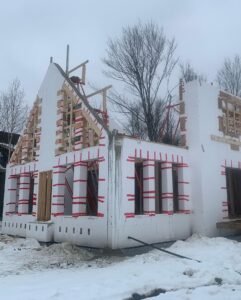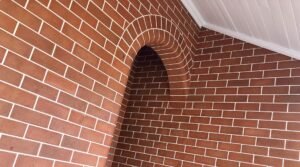Your home or property is built to last, but keeping it in top shape takes regular care and attention. Masonry, whether it’s brickwork, stone, or concrete, is a key part of your property’s structure and appearance. But how do you know when it needs professional help? Here are the top 5 signs that you may need masonry work, along with tips on why addressing these problems sooner rather than later can save you time and money.
Table of Contents
Toggle1. Cracks in the Bricks or Stonework
Cracks in bricks or stone aren’t just cosmetic issues—they’re red flags. Often, these cracks indicate shifting or settling in your home’s foundation, and ignoring them can lead to more severe problems like water infiltration or structural instability. Small cracks might look harmless, but they can widen over time, making repairs more expensive. If you notice jagged or stair-step cracks, it’s time to have a professional mason assess the damage.
2. Crumbling or Missing Mortar
Mortar holds everything together, so if it starts to crumble, your entire masonry structure is at risk. Over time, weather and moisture take their toll, weakening the mortar and causing it to erode. This condition, often called “tuckpointing,” can lead to loose bricks or stones, which eventually weaken the wall or structure. Replacing deteriorated mortar not only restores the stability of your masonry but also helps maintain its appearance.
3. Water Damage and Efflorescence
Do you see white, powdery streaks or stains on your brick or stone surfaces? That’s called efflorescence, and it’s a clear sign of water damage. When water seeps into masonry and evaporates, it leaves behind salts that can cause discoloration and eventual degradation of the material. Left untreated, excess moisture can lead to mold growth or further structural damage. Proper drainage, waterproofing, and repair work can resolve this issue and protect your investment.
4. Leaning Walls or Chimneys
A leaning wall or chimney is more than an eyesore—it’s a potential danger. This issue often stems from foundational shifts or weakened masonry. Catching the problem early lets you fix it before it turns into a safety hazard or requires extensive rebuilding. If you see tilting or feel uncertain about the stability of your walls or chimney, don’t wait to call in the professionals.
5. Outdated or Damaged Aesthetics
While structural damage is a big concern, outdated or unsightly masonry can also impact your home’s value. Whether it’s faded bricks, mismatched repairs, or old mortar, the appearance of your masonry matters. Restoring or upgrading old masonry can breathe new life into your property, improving curb appeal and ensuring the structure looks as good as it functions.
Why Timely Repairs Matter?
Putting off masonry repairs can lead to bigger bills and more serious problems down the line. Cracks grow, water damage worsens, and structural issues escalate the longer they go untreated. By acting at the first sign of trouble, you not only maintain the safety of your property but also preserve its value and aesthetics for years to come.
Call TheFixitGuys Today
If you’ve noticed any of these signs, don’t wait—TheFixItGuys is here to help. Our team of skilled masons can inspect your property, identify issues, and provide quality repairs that stand the test of time. Whether it’s restoring crumbling mortar, fixing cracks, or sprucing up outdated brickwork, we’ve got you covered.
Contact us today to schedule a consultation. Let’s keep your home safe, strong, and beautiful!















